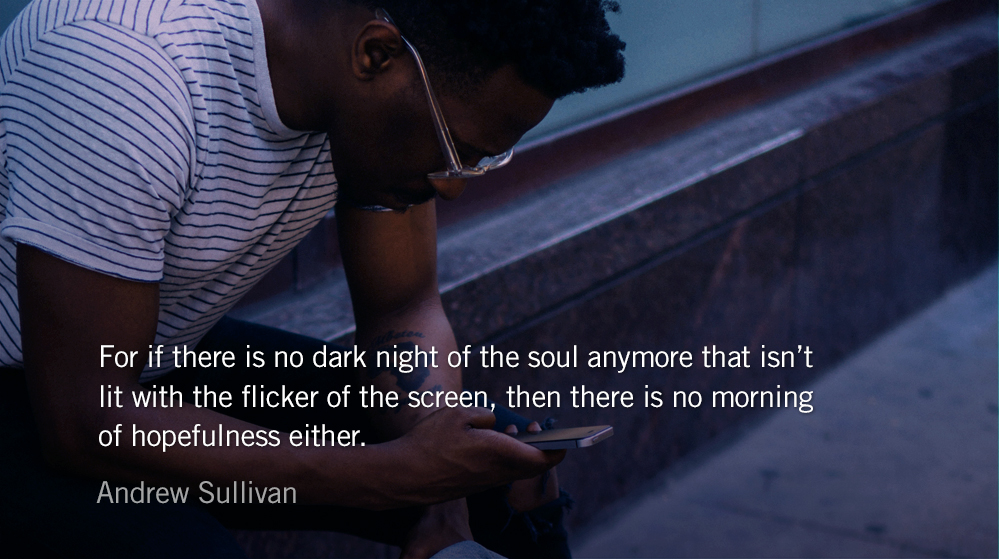We love our screens. And we now spend more time each day staring into these glowing windows to the digital world than anything else, including sleep, according to a survey from the U.K.
For many people of faith technology has become a normal part part of our daily religious practice (online and email devotional, anyone?). Yet if we do not pause to examine what place technology commands in our lives, we can easily overlook what we lose by its incessant presence.
“For if there is no dark night of the soul anymore that isn’t lit with the flicker of the screen, then there is no morning of hopefulness either,” laments journalist Andrew Sullivan. In Biblical times we would have added a Selah after a statement like that—a pause to reflect on God, life, and how this idea should shape our souls. But that pause—the moment where nothing is clamoring for, or algorithmically abducting our attention—is exactly what technology has removed.
In his book Glow Kids, which explores the impact of technology on kids, Dr. Nicholas Kardaras calls technology “digital heroin.” Dr. Kardaras, who has worked with over 1,000 kids and is the executive director at The Dunes East Hampton rehab center, remarks, “I have found it easier to treat heroin and crystal meth addicts than lost-in-the-matrix video gamers or Facebook-dependent social media addicts.” He continues:
We now know that those iPads, smartphones and Xboxes are a form of digital drug. Recent brain imaging research is showing that they affect the brain’s frontal cortex—which controls executive functioning, including impulse control—in exactly the same way that cocaine does. Technology is so hyper-arousing that it raises dopamine levels—the feel-good neurotransmitter most involved in the addiction dynamic—as much as sex.
Understanding the dangers of modern technology’s dominance in our lives helps us lay a pathway for the future, and for faith. Sullivan believes the Church could play a distinct role in this kind of culture:
If the churches came to understand that the greatest threat to faith today is not hedonism but distraction, perhaps they might begin to appeal anew to a frazzled digital generation. Christian leaders seem to think that they need more distraction to counter the distraction. Their services have degenerated into emotional spasms, their spaces drowned with light and noise and locked shut throughout the day, when their darkness and silence might actually draw those whose minds and souls have grown web-weary.
When it comes to our personal devotion, daily moments of meditation, reflection on Scripture, or time invested in lectio divina can refresh us in ways that one more scroll on our screens will never do. The core friction that prevents us from engaging in these pauses is not technology itself, but the amount of time we’ve forfeited to it. But, as Sullivan concludes, the stakes couldn’t be higher:
This new epidemic of distraction is our civilization’s specific weakness. And its threat is not so much to our minds, even as they shape-shift under the pressure. The threat is to our souls. At this rate, if the noise does not relent, we might even forget we have any.
Weekend Reading List
- I Used to Be a Human Being. Andrew Sullivan for NY Magazine.
- Why The Church Can Rescue Us From Our Smartphones. Russell Moore for the Washington Post.
- It’s ‘Digital Heroin’: How Screens Turn Kids Into Psychotic Junkies. Dr. Nicholas Kardaras for the New York Post.
- Research Says: Young People Don’t Want Hip Pastors. Kara Powell, Jake Mulder, and Brad Griffin for Christianity Today.
Today’s Reading
Ezekiel 26 (Listen – 3:45)
Psalms 74 (Listen – 2:34)
This Weekend’s Readings
Ezekiel 27 (Listen – 5:15) Psalms 75-76 (Listen – 2:33)
Ezekiel 28 (Listen – 4:32) Psalms 77 (Listen – 2:12)






